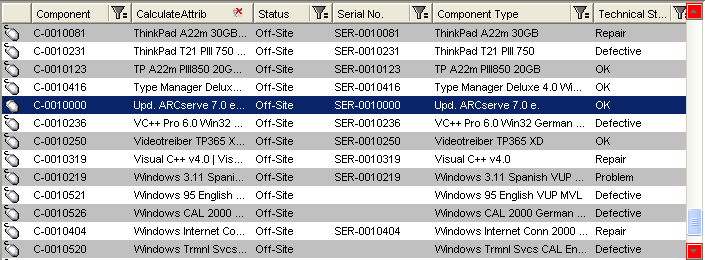Example
Let's have a catalog of Components based on a database table containing 100000objects.
Let's specify a search condition: Status = Off-Site and press Search. The number of objects matching the condition is now 143.
Initial Load is set to 100. This means that not all objects matching the condition have been read to memory.
The catalog now looks like this:

The second column in the catalog represents a calculated attribute. Because not all of the objects matching the condition are in memory now, it will not be possible to use this attribute for sorting. Trying to do so brings about a red scroll bar, which signifies that further scrolling has been disabled. (See Limitations Explanation for more details)

Workarounds:
- Try sorting by another attribute.
This is the solution applicable in this example. In addition to solving the problem it may generally also represent a more logical option.
- Make the search condition more restrictive
In some cases, making the search condition more restrictive might help to reduce the number of matching objects so that they all fit into memory, thus making it possible to sort by any attribute with no restrictions.
Additional workaround (not always applicable)
As mentioned in the explanation of what "fit into memory" means, sometimes an operation which was not available initially when the catalog was opened may become available in the course of working with the catalog.
Let's demonstrate this using the above example.
There are 143 objects matching the condition, Initial Load is 100, Load Increment is also 100 (both of these are current settings, made in Limit settings). This means that with the next incremental read, all of the objects matching the condition will be have been read into memory. Taking the situation depicted in the image above as a starting point, let's do the following:
- Try sorting by another attribute. Sorting by Component disengages the red scroll bar and makes further browsing possible.
- Browse to the end of the scroll bar. As a result, more objects are read to memory. In our case it means that now all requested objects are now in memory.
- At this point, try sorting by the calculated attribute again. No red scroll bars should appear now and the objects should get sorted by the attribute of our choice.
Please note that whether this little "trick" is applicable or not depends on the mutual relation between the currently set values of Initial Load, Load Increment and the total number of objects matching the currently specified search condition.